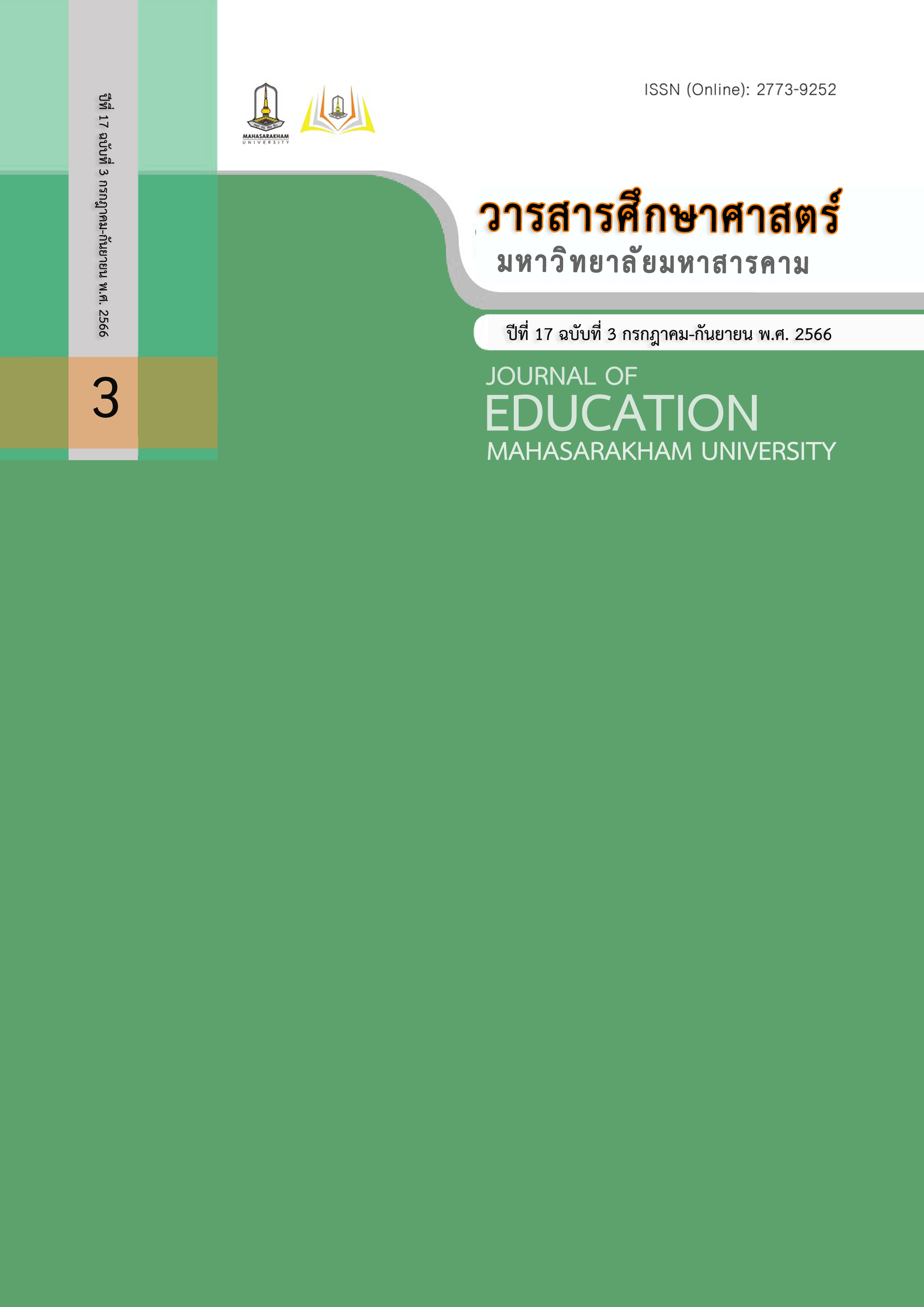The Development of Active Learning and Online Tools for Supporting Vietnamese Comprehensive Reading Ability of Mahasarakham University Students
Main Article Content
Abstract
The purposes of this research were: 1) to determine the efficiency of active learning management with online learning tools that can increase Vietnamese comprehensive reading ability and learning participation of Mahasarakham University students with 80/80 criteria of effectiveness, 2) to study the ability to read Vietnamese for comprehension after learning management with criteria points of 70%, 3) to study students' participation, and 4) to study the satisfaction of the students with this particular learning management. The target population consisted of 14 students in first-year Vietnamese Major, Mahasarakham University, semester 2/2022. The action research with four spirals was employed to this research. The research tools were 1) lesson plans for teaching and learning, 2) the feedback tools including post-learning forms, the observation forms of student participation observing the students’s behavior during learning management, the student interview forms, and the end-of-spiral mini tests, 3) the assessment tools of the effective learning management consisting of Vietnamese comprehensive reading tests and the questionnaires measuring the students’ satisfaction. The statistics used to analyze the data were percentage, mean, and standard deviation.
The results of the research appeared as follows:
1) Active learning management with online learning tools promoting Vietnamese comprehensive reading ability and learning participation of Mahasarakham University students was E1/E2 which exceeded the threshold of 80/80. 2) An average value of Vietnamese comprehensive reading ability of students was 24.79 out of 30, calculated in percentage as 86.62% - there were 13 of 14 students who passed the tests accoding to the criteria of standard, calculated in percentage as 92.85%, which is higher than the threshold. 3) The students’ participation was positive at a high level. 4) The Students’ satisfaction with the learning management were at the highest level.
Downloads
Article Details

This work is licensed under a Creative Commons Attribution-NonCommercial-NoDerivatives 4.0 International License.
References
กมล โพธิเย็น. (2564). Active Learning: การจัดการเรียนรู้ที่ตอบโจทย์การจัดการศึกษาในศตวรรษ ที่ 21. วารสารศึกษาศาสตร์ มหาวิทยาลัยศิลปากร, 19(1), 11-28.
กษมา สุรเดชา. (2562). ผลการใช้ชุดกิจกรรม Active Learning เพื่อเสริมสร้างทักษะการอ่านจับ ใจความและเจตคติต่อการอ่านของนักศึกษาโปรแกรมวิชาภาษาไทยชั้นปีที่ 2 คณะครุศาสตร์ มหาวิทยาลัยราชภัฏกำแพงเพชร. รายงานสืบเนื่องการประชุมวิชาการระดับชาติ ครุศาสตร์ศึกษาครั้งที่ 2 (Proceedings) ณ มหาวิทยาลัยราชภัฏพิบูลสงคราม จังหวัดพิษณุโลก ระหว่างวันที่ 21-22 มีนาคม 2562, 18-26.
ชานนท์ ภาคกินนร และคนอื่นๆ. (2563). ผลการพัฒนาพฤติกรรมการมีส่วนร่วมในกิจกรรมการ เรียนรู้วิชาภาษาอังกฤษโดยใช้เกมคำศัพท์ของนักเรียนระดับชั้นมัธยมศึกษาปีที่ 1 โรงเรียนฤ ทธิยะวรรณาลัย. ศึกษาศาสตร์สาร มหาวิทยาลัยเชียงใหม่, 4(2), 45-55.
ณัฐวดี ธาตุดี. (2561). การพัฒนาความสามารถด้านการอ่านอย่างมีวิจารณญาณของนักเรียนชั้น มัธยมศึกษาปีที่ 3 โดยการจัดกิจกรรมการเรียนรู้เชิงรุก (Active Learning). วิทยานิพนธ์ กศ.ม., มหาวิทยาลัยศิลปากร, กรุงเทพฯ.
ทัศนีย์ เสถียรภัทรนันท์. (2561). การพัฒนาความสามารถในการคิดวิเคราะห์ และผลสัมฤทธิ์ทางการ เรียนด้วยการจัดการเรียนรู้แบบผสมผสาน โดยใช้แอพพลิเคชั่นเกมตอบคําถามออนไลน์ (Kahoot) กลุ่มสาระ การเรียนรู้สังคมศึกษา ศาสนาและวัฒนธรรม สำหรับนักเรียนชั้น มัธยมศึกษาปีที่ 4. วิทยานิพนธ์ กศ.ม., มหาวิทยาลัยขอนแก่น, ขอนแก่น.
พงษ์สิทธิ์ พลีกร. (2562). ผลของการจัดการเรียนรู้ตามแนวคิดห้องเรียนกลับทางร่วมกับรูปแบบเกม โชว์โทรทัศน์ที่มีผลต่อการคิดวิเคราะห์วิชาภาษาไทยเพื่อการศึกษาต่อเรื่องการสร้างคำของ นักเรียนชั้นมัธยมศึกษาปีที่ 6. วิทยานิพนธ์ กศ.ม., มหาวิทยาลัยธรรมศาสตร์, กรุงเทพฯ.
ภัทราดา เอี่ยมบุญญฤทธิ์ และคนอื่นๆ. (2563). การสอนอ่านเชิงวิเคราะห์ผ่านกระบวนการเรียนรู้ แบบ Active Learning เพื่อพัฒนาทักษะการคิดวิเคราะห์ของเด็กไทยยุค Gen Z. วารสาร ศึกษาศาสตร์ มหาวิทยาลัยบูรพา, 31(3), 1-11.
ยุพกา ฟูกุชิม่า. (2564). การทดลองจัดการเรียนการสอนเชิงรุกในรายวิชาการอ่านภาษาญี่ปุ่นขั้นสูง. วารสารมนุษยศาสตร์วิชาการ, 28(2), 311-357.
วรพงษ์ แสงประเสริฐ. (2564). ผลการสอนการอ่านโดยใช้เกมมิฟิเคชั่นที่มีต่อผลสัมฤทธิ์ในการอ่าน ภาษาอังกฤษเพื่อความเข้าใจและเจตคติที่มีต่อการสอนอ่านของนักเรียนมัธยมศึกษาตอน ปลาย. การประชุมเสนอผลงานวิจัยระดับชาติ มหาวิทยาลัยสุโขทัยธรรมาธิราชครั้งที่ 10 ณ มหาวิทยาลัยสุโขทัยธรรมาธิราช จังหวัดนนทบุรี วันที่ 27 พฤศจิกายน 2563, 85-94.
สุริสา ไวแสน และ สุวัฒน์ จุลสุวรรณ์. (2565). การพัฒนาแนวทางเสริมสร้างทักษะการจัดการเรียนรู้ ในศตวรรษที่ 21 ของครูในสถานศึกษา สังกัดสำนักงานเขตพื้นที่การศึกษามัธยมศึกษา เขต 24. วารสารนวัตกรรมการบริหารและการจัดการ, 10(1), 59-66.
Supaporn Manowong. (2017). Incorporating Online Tools to Promote English Reading for EFL Learners: an Action Research Study. Pasaa Paritat Journal, 32, 98-124.
Wibisono, D. (2019). The effects of Kahoot in teaching reading to tenth grade students of senior high school. Thesis, Widya Mandala Catholic University, Surabaya.
Wijayanti, E. (2022). Teaching English by using Canva: students’ and lecturers’ voice. Academic Journal of English Language and Education, 6(2), 411-428.


